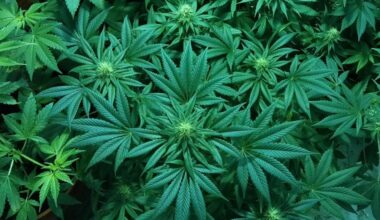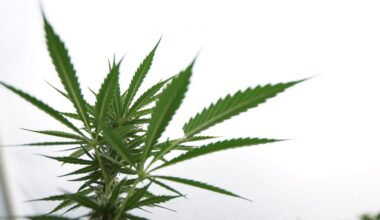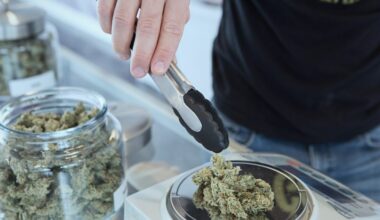Colombia’s recently inaugurated president told members of the United Nations (UN) on Tuesday that “democracy will die” if global powers don’t unite to end the drug war and pursue a different approach, with millions of lives on the line under the current regime.
President Gustavo Petro also separately said in a new interview this week that the U.S. and other countries will enable a “genocide” of avoidable overdose deaths if leaders maintain the status quo of criminalization.
In a speech before the UN’s General Assembly on Tuesday, Petro said definitively that the “war on drugs has failed,” according to a translation.
“The war on drugs has lasted 40 years. If we do not correct the course, and this continues another 40 years, the United States will see 2.8 million die of overdoses [from fentanyl], which is not produced in our Latin America,” he said. “You will see millions of African Americans be imprisoned in their private prisons. The [Black] prisoner will become a business of prison companies.”
“Les propongo como Presidente de uno de los paises más hermosos de la tierra y de los más ensangrentados y violentados, acabar la guerra contra las drogas, y así, permitir que nuestro pueblo pueda vivir en paz”: Presidente @petrogustavo en la @UN. #ColombiaEnLaONU 🇺🇳🇨🇴#UNGA pic.twitter.com/U6D1iraodU
— Presidencia Colombia 🇨🇴 (@infopresidencia) September 20, 2022
The president added that another one million Latin Americans will die as a consequences of this policy and “they will fill our lives with blood.”
They will “see the dream of democracy die, both in my America as in Anglo-Saxon America,” he said.
Meanwhile, during his first U.S. broadcast interview, Petro put the situation in similarly stark terms, saying that while he’s spoken with officials in the Biden administration who’ve recognized the failures of drug criminalization, there must be a united effort to change course, or else countries will pay the price.
“The American government is like a slow animal. Great transformations don’t happen overnight,” Petro told GZERO, according to a translation. “They happen very slowly. I have observed a much more open mindset in Biden government officials today around this topic.”
He said that the Biden administration understands that criminalization has led to the incarceration of millions of people, disproportionately Black Americans.
Prohibition “will leave us Latin Americans with one million more dead and the mafia organizations will be ten times more powerful than they already are,” he stated.
Petro, a liberal who campaigned on taking a radically different approach to drug issues, said that famed drug trafficker Pablo Escobar would “shudder” at the strength of today’s “multinational cocaine organizations” that are “strong simply because drugs are banned.”
“The war on drugs has created its own enemy, which has grown in power and strength,” the president said. “Peace in Colombia depends on building a new drug policy on a new vision. If not, they condemn us to genocide.”
He also stressed that Latin American countries must “come together in this,” saying that it’s “shameful that we have been the producers of the coca leaf or cocaine” and “believed that we must silence ourselves and accept the policies of world power in this regard, even though they are totally wrong.”
“This must end. We do not have to be a space for genocide for the deaths of millions of people because of a policy that is completely wrong,” he said. “A dialogue with the world is required—a dialogue with the United States with an independent voice.”
Petro also recently talked about the prospects of legalizing marijuana in Colombia as one means of reducing the influence of the illicit market. And he signaled that the policy change should be followed by releasing people who are currently in prison over cannabis.
He spoke about the economic potential of a legal cannabis industry, one where small towns in places like the Andes, Corinto and Miranda could stand to benefit from legal marijuana cultivation, possibly without any licensing requirements.
The president also signaled that he’d be interested in exploring the idea of exporting cannabis to other countries where the plant is legal.
A legalization bill championed by Colombian Sen. Gustavo Bolívar was introduced in July, and the senator said that the reform is within reach now that the country’s Congress has a liberal majority of lawmakers who fit within a political coalition known as the Historic Pact.
Meanwhile, Petro also recently discussed his views on ending the broader war on drug in his inaugural address last month, emphasizing the need for the international community to become unified around the idea that criminalization as a policy has failed.
U.S. Rep. Jim McGovern (D-MA), who chairs the powerful House Rules Committee, cheered the official swearing in of Petro, saying that he looks forward to “working together to…rethink drug policy, and much more.”
President Joe Biden, on the other hand, seems intent on perpetuating the drug war in Colombia, with U.S. military support. He released a memorandum to the defense secretary last month that authorizes the “interdiction of aircraft reasonably suspected to be primarily engaged in illicit drug trafficking in that country’s airspace.”
He said that it’s “necessary because of the extraordinary threat posed by illicit drug trafficking to the national security of that country” and because “Colombia has appropriate procedures in place to protect against innocent loss of life in the air and on the ground in connection with such interdiction, which includes effective means to identify and warn an aircraft before the use of force is directed against the aircraft.”
As a former member of Colombia’s M-19 guerrilla group, Petro has seen the violent conflict between guerrilla fighters, narcoparamilitary groups and drug cartels that has been exacerbated by the government’s aggressive approach to drug enforcement.
According to the United Nations Office of Drug Control Policy (ONDCP), Colombia remains a chief exporter of cocaine, despite “drug supply reduction activities in Colombia, such as eradication of coca bush and destruction of laboratories.”
In 2020, Colombian legislators introduced a bill that would have regulated coca, the plant that is processed to produce cocaine, in an acknowledgment that the government’s decades-long fight against the drug and its procedures have consistently failed. That legislation cleared a committee, but it was ultimately shelved by the overall conservative legislature.
Advocates are optimistic that such a proposal could advance under a Petro administration. The president hasn’t taken a clear stance on the legislation itself, but he campaigned on legalizing marijuana and promoted the idea of cannabis as an alternative to cocaine.
Former Colombia President Juan Manuel Santos has also been critical of the drug war and embraced reform. In an editorial published before he left office, he criticized the United Nations and U.S. President Richard Nixon for their role in setting a drug war standard that has proved ineffective at best and counterproductive at worst.
“It is time we talk about responsible government regulation, look for ways to cut off the drug mafias’ air supply, and tackle the problems of drug use with greater resources for prevention, care and harm reduction with regard to public health and the social fabric,” he said.
“This reflection must be global in scope in order to be effective,” Santos, who is a member of the pro-reform Global Commission on Drug Policy, said. “It must also be broad, including participation not only of governments but also of academia and civil society. It must reach beyond law enforcement and judicial authorities and involve experts in public health, economists and educators, among other disciplines.”
German Lawmakers Tour California Marijuana Businesses To Inform National Legalization Plans
Image element courtesy of Bryan Pocius.
Medical Disclaimer:
The information provided in these blog posts is intended for general informational and educational purposes only. It is not a substitute for professional medical advice, diagnosis, or treatment. Always seek the advice of your physician or other qualified healthcare provider with any questions you may have regarding a medical condition. The use of any information provided in these blog posts is solely at your own risk. The authors and the website do not recommend or endorse any specific products, treatments, or procedures mentioned. Reliance on any information in these blog posts is solely at your own discretion.







